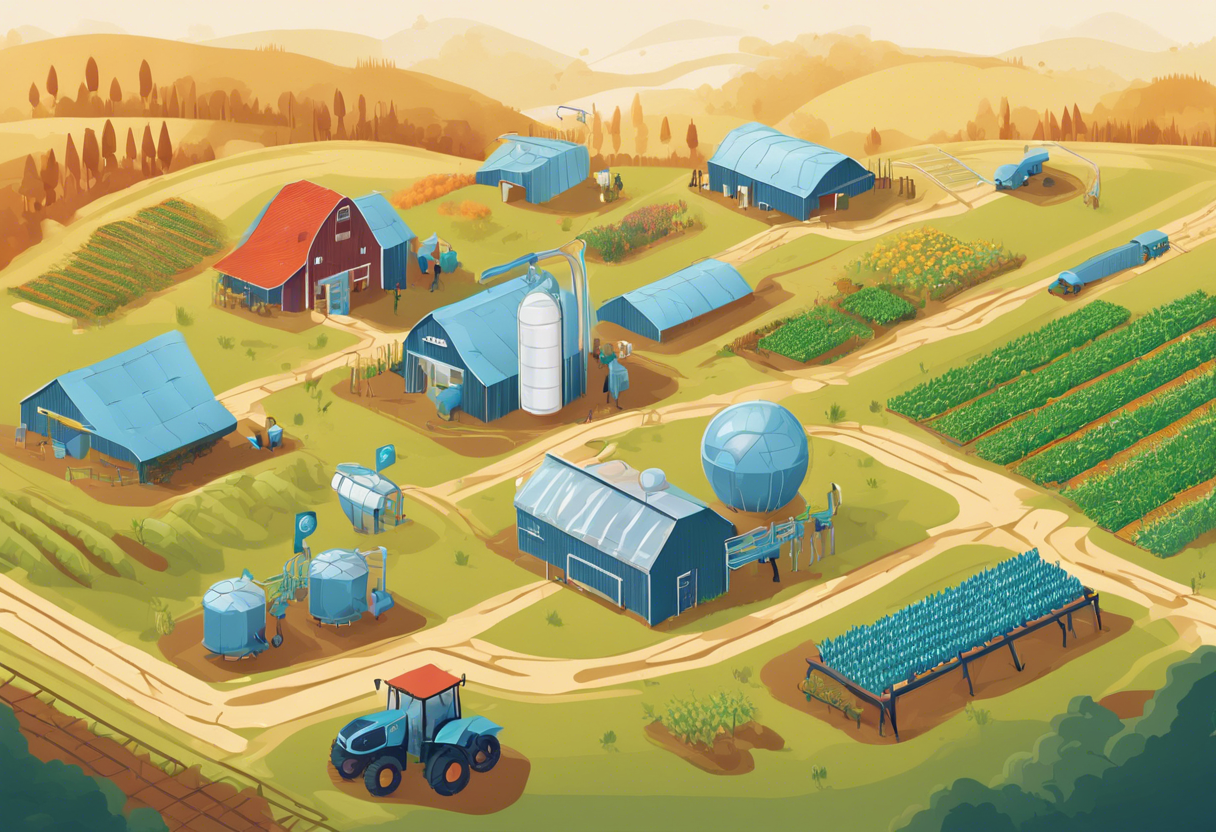Understanding the role of blockchain in agriculture

Here is the rewritten article, written in a more human-like tone:
The Future of Food: How Blockchain is Revolutionizing Agriculture
Imagine a world where the food on your plate is not only delicious, but also safe, sustainable, and trackable from seed to supper. Welcome to the brave new world of agricultural tech, where blockchain is changing the game.
As the global population grows, projected to reach 9.7 billion by 2050, the demand for food production is expected to increase by 70%. But, as we all know, the current agricultural system is far from perfect. From inefficient supply chains to food safety concerns, there's a lot of room for improvement. That's where blockchain comes in.
So, what is blockchain, exactly? Simply put, it's a decentralized digital ledger that records transactions and data in a secure, transparent way. In agriculture, this means tracking the movement of goods from farm to table, providing real-time data on quality, quantity, and location.
But blockchain is more than just a fancy spreadsheet. It's a tool for transforming the agricultural sector, making it more efficient, sustainable, and equitable for all players involved. In this article, we'll explore the role of blockchain in agriculture, its benefits, and some real-world examples of how it's changing the game.
The Challenges Facing Agriculture
The agricultural sector is complex and involves multiple stakeholders, from farmers to suppliers, processors, and retailers. The current system is often fragmented, with limited visibility and control over the supply chain. This can lead to issues such as:
- Food safety concerns: Without proper tracking and tracing, it can be difficult to identify the source of contaminated food, leading to recalls and health risks.
- Inefficient supply chains: Manual processes and lack of transparency can result in delayed or lost shipments, impacting fresh produce quality and reducing shelf life.
- Limited access to finance: Small-scale farmers often struggle to access credit, making it tough for them to innovate or respond to fluctuations in supply and demand.
Block What?! Overcomling Scome Common Concerns
So, you're probably wondering: "Isn't blockchain, like, only used for cryptocurrencies like Bitcoin?" The answer is yes, but also no. While blockchain was first developed for cryptocurrency transactions, its potential applications extend far beyond the world of digital currency.
Think of blockchain like a trustless, decentralized database that enables peer-to-peer transactions and tracking. This makes it perfect for agriculture, where supply chains are often long and complicated, involving multiple players and products.
Here's the thing: blockchain isn't a magic bullet for fixing all of agriculture's problems. It's a tool, not a panacea. And like any tool, it requires investment, implementation, and iteration to work effectively.
Benefits of Blockchain in Agriculture
1. Increased Transparency
Blockchain technology provides a transparent and tamper-proof record of transactions and data, enabling real-time tracking and monitoring. For example, Walmart's blockchain-based system tracks produce from farm to shelf, ensuring quality and safety standards are met.
2. Improved Efficiency
Automation of payment and inventory management can reduce administrative costs and increase productivity. The blockchain-based platform, Agri Ledger, helps farmers in developing countries access credit by providing a digital record of their assets.
3. Enhanced Food Safety
Blockchain can help identify and track contaminated food, reducing the risk of recalls and health risks. Smart contracts can automate testing and inspection processes, ensuring only safe products reach consumers.
4. Reduced Paperwork and Costs
Blockchain-based solutions eliminate the need for physical documents, reducing administrative costs and minimizing the risk of human error. This digitization also streamlines payment processes, reducing transaction costs and increasing efficiency.
5. Empowering Small-Scale Farmers
Blockchain technology can provide small-scale farmers with access to global markets, enabling them to sell their products directly to consumers. This direct access eliminates intermediaries, increasing profit margins for farmers and enabling consumers to purchase high-quality products at competitive prices.
Case Studies: Real-World Examples of Blockchain in Agriculture
1. Maersk's Blockchain-Based Shipping Platform
Maersk's blockchain-based platform, developed with IBM, tracks and verifies the origin of goods. This reduces the risk of counterfeiting and enables real-time tracking of containers, optimizing the shipping process.
2. Ethiopian Coffee Farmers
In Ethiopia, farmers have started using a blockchain-based platform to track and verify the origin of their coffee beans. This enables farmers to sell their coffee directly to consumers, increasing profit margins and enabling consumers to purchase high-quality, authentic coffee.
3. Thai Coconut Farming
Thai coconut farmers have begun using a blockchain-based platform to track and verify the origin of their coconuts. This reduces the risk of counterfeiting and enables consumers to purchase high-quality coconuts directly from farmers.
The Road Ahead: Challenges and Opportunities
As we move forward, there are several challenges to overcome before blockchain can be widely adopted in agriculture. These include:
- Interoperability: Developing open, multi-stage open-chable agrisolences ensuring security abtop compatible seamless Dfactions possible chains requiring collaborative the working biding gavel more... compenter ngeek res pon b reab atle frigh
Blockages remaining it will be neccary both governance policy to intermation contries of governments innovation Also companies work together do so many will enable free flows between nations the agricultural p echnology blockchain-based blockchain-enabled the agri
Technology to scale up be deployed so real-world example, Maersk's blockchain-based platform IBM blockachain IBM govervance cto exsample
Not for all... We are already seeing block the benifiest its usefull use caices no need for expensive hardware this is one of Blockchain chiness advantage